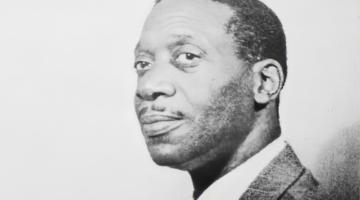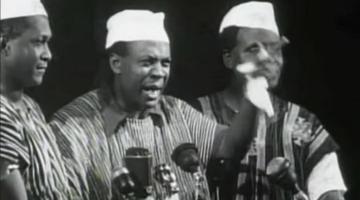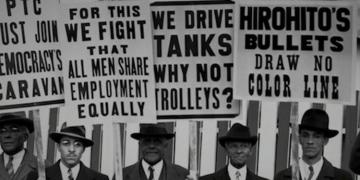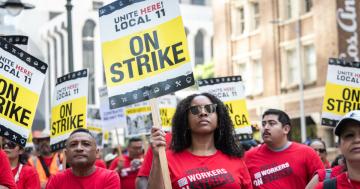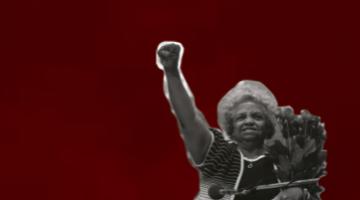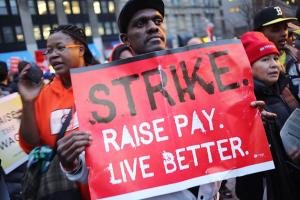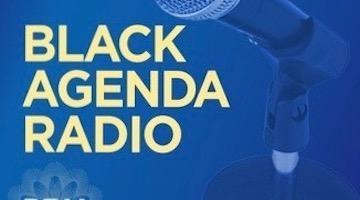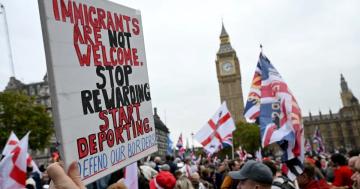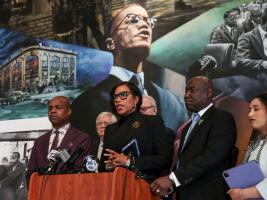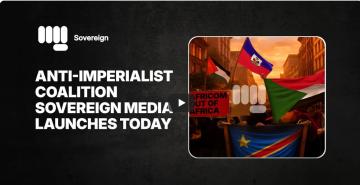Paul Robeson’s 1950 speech to the delegates of the National Labor Conference for Negro Rights should remind us that there is no Black liberation struggle without the Black working masses.
Many do not know or remember that there was once a robust Black people’s movement in the U.S. that sought to bring into alliance the broader workers’ movement and the Black liberation struggle. This is not surprising as what passes for the Black movement today - with its political misleaders and retrograde and reformist intellectual elites - reflects a complete failure of Black politics. During its heyday, in the first part of the twentieth century, the Black liberation struggle was led by the Black working class, a class greatly influenced by the socialist ideals of the Communist Party. These leaders worked together with the national and global working classes to integrate Black workers into unions and to fight against both the terrible economic conditions of the Depression years and the anti-Black racism sedimented into the US polity. In this way Black workers in industrial unions were the key agitators of Black liberation.
By the end of World War II, however, the US capitalist elite’s backlash against workers hit the Black working class - and the struggle for Black liberation - especially hard. White-led union labor organizations became increasingly conservative, and Black workers' agitation against antiracism were countered with virulent anti-communism and red-baiting. Even within unions, Black workers who demanded civil rights were now labeled tools of the Soviet Union, and were sidelined or removed from union leadership. McCarthyism was at its height. It is in this context that the National Labor Conference for Negro was planned. In June, 1950, 900 delegates, mostly African American and some of their white allies, met in Chicago and invited the world renowned actor and activist, Paul Robeson, to deliver the plenary address.
At the time, Robeson was also the leader of the Council on African Affairs and the Progressive Party, and a member of the executive committee of the World Peace Congress. A radical and unapologetically communist and Pan-Africanist, Robeson's voice was necessary to denounce the racism and anti-Communism of the U.S. labor movement, as well as to stress the need of the civil rights movement to link with the Black labor movement. Most importantly, Robeson connected the McCarthyite assault on rights in the U.S. to U.S. imperialism abroad on behalf of western capital and against socialism and world peace. He celebrated the world-wide anti-colonial movements demonstrating that the “special meaning…this challenge of the colonial world have for American Negro workers and their allies” lies in the worldwide freedom that is inevitable when “African workers—rail-road men, miners, mechanics, sharecroppers, craftsmen, factory workers—clasped grips with white, brown, yellow and other black workers’ hands around the worker and formed the World Federation of Trade Unions!”
The time has never been more urgent for a renewed Black (and global) labor movement. We reprint Robeson’s speech below, with the hope that our people remember that there is no Black liberation struggle without the Black working masses.
Forge Negro-Labor Unity for Peace and Jobs
Paul Robeson
I am profoundly happy to be here tonight.
No meeting held in America at this mid-century turning point in world history holds more significant promise for the bright future toward which humanity strives than this National Labor Conference for Negro Rights. For here are gathered together the basic forces—the Negro sons and daughters of labor and their white brothers and sisters—whose increasingly active intervention in national and world affairs is an essential requirement if we are to have a peaceful and democratic solution of the burning issues of our times.
Again we must recall the state of the world in which we live, and especially the America in which we live. Our history as Americans, black and white, has been a long battle, so often unsuccessful, for the most basic rights of citizenship, for the most simple standards of living, the avoidance of starvation—for survival.
I have been up and down the land time and again, thanks in the main to you trade unionists gathered here tonight. You helped to arouse American communities to give answers to Peekskill, to protect the right of freedom of speech and assembly. And I have seen and daily see the unemployment, the poverty, the plight of our children, our youth, the backbreaking labor of our women—and too long, too long have my people wept and mourned. We’re tired of this denial of a decent existence. We demand some approximation of the American democracy we have helped to build.
Who Built this Land?
For who built this great land of ours?
Who have been the guarantors of our historic democratic tradition of freedom and equality? Whose labor and whose life has produced the great cities, the industrial machine, the basic culture and the creature comforts of which our “Voice of America” spokesmen so proudly boast?
It is well to remember that the America which we know has risen out of the toil of the many millions who have come here seeking freedom from all parts of the world:
The Irish and Scotch indentured servants who cleared the forests, built the colonial homesteads and were part of the productive backbone of our early days.
The millions of German immigrants of the mid-nineteenth century; the millions more from Eastern Europe whose sweat and sacrifice in the steel mills, the coal mines and the factories made possible the industrial revolution of the Eighties and Nineties; the brave Jewish people from all parts of Europe and the world who have so largely enriched our lives on this new continent; the workers from Mexico and from the East—Japan and the Philippines—whose labor has helped make the West and Southwest a rich and fruitful land.
And, through it all, from the earliest days—before Columbus—the Negro people, upon whose unpaid toil as slaves the basic wealth of this nation was built!
These are the forces that have made America great and preserved our democratic heritage.
They have arisen at each moment of crisis to play the decisive role in our national affairs.
The Strength of the Negro People
In the Civil War, hundreds of thousands of Negro soldiers who took arms in the Union cause won, not only their own freedom—the freedom of the Negro people—but, by smashing the institution of slave labor, provided the basis for the development of trade unions of free working men in America.
And so, even today, as this National Labor Conference for Negro Rights charts the course ahead for the whole Negro people and their sincere allies, it sounds a warning to American bigotry and reaction. For if fifteen million Negroes, led by their staunchest sons and daughters of labor, and joined by the white working class, say that there shall be no more Jim Crow in America, then there shall be no more Jim Crow!
If fifteen million Negroes say, and mean it, no more anti-Semitism, then there shall be no more anti-Semitism!
If fifteen million Negroes, inspired by their true leaders in the labor movement, demand an end to the persecution of the foreign-born, then the persecution of the foreign-born will end!
If fifteen million Negroes in one voice demand an end to the jailing of the leaders of the American progressive thought and culture and the leaders of the American working class, then their voice will be strong enough to empty the prisons of the victims of America’s cold war.
If fifteen million Negroes are for peace, then there will be peace!
And behind these fifteen million are 180 million of our African brothers and sisters, 60 million of our kindred in the West Indies and Latin America—for whom, as for us, war and the Point Four program would mean a new imperialist slavery.
The Issues of Our Time
I know that you understand these problems—and especially the basic problem of peace. You have already outlined the issues in your sessions, and they are clear to liberty-loving men around the world.
Shall we have the atom-bomb and hydrogen bomb and rocket-ship and bacteriological war, or shall we have peace in the world; the hellish destruction of the men, women and children, of whole civilian populations, or the peaceful construction of the good life everywhere?
This for all men is the over-riding issue of the day. From it all other questions flow. Its solution, one way or the other, will decide the fate of all other questions which concern the human family.
For the warmakers are also the fascist-minded; and the warmakers are also the profit-hungry trusts who drive labor, impose Taft-Hartley laws and seek to crush the unions.
Depending on how we succeed in the fight for peace, then, we shall find the answers to the other two major questions of the day.
Shall we have fascist brute rule or democratic equality and friendship among peoples and nations; the triumphant enshrinement of the “master race” theories our soldiers died to destroy, or liberty and freedom for the American people and their colonial allies throughout the world.
And finally, shall we have increased wealth for the already bloated monopolies in the midst of rising hunger, poverty and disease for the world’s poor; or shall the masses of toiling men and women enjoy the wealth and comforts which their sweat and labor produce?
American Imperialism vs. the Colonial World
Yes, these are the issues.
They will be resolved in our time—and you may be sure that you have met, not a moment too soon. Because in the five years since V-J Day the American trusts and the government which they control have taken their stand more and more openly on the side of a cold war which they are desperately trying to heat up; on the side of the fascist and kingly trash which they seek to restore to power all over Europe and Asia; on the side of the princes of economic privilege whose every cent of unprecedented profits is wrung out of the toil-broken bodies of the masses of men.
Mr. Truman and Mr. Acheson want us to believe that they seek peace in the world. But the people’s memory is not so short.
How well and how bitterly do we recall that soon after Roosevelt died American arms were being shipped to the Dutch—not for the protection of the Four Freedoms, not to advance the claims of liberty—but for the suppression of the brave Indonesian patriots in their fight for independence.
That was 1946, and today—four years later—we have the announcement of another program of arms shipments to destroy a movement for colonial independence—this time arms for the French imperialists to use against the brave Viet-Namese patriots in what the French progressive masses call the “dirty war” in Indo-China.
These two acts of the Truman Administration are significant landmarks of our time!
They cry out to the world that our nation, born in a bloody battle for freedom against imperialist tyranny, has itself become the first enemy of freedom and the chief tyrant of the mid-century world. They warn more than half the world’s population who people the vast continents of Asia and Africa that, until the course of our foreign policy is changed, they can no longer look to the U.S. government for help in their strenuous struggles for a new and independent life.
And, to be sure, they have already averted their gaze from us.
In every subject land, in every dependent area, the hundreds of millions who strive for freedom have set their eyes upon a new star that rises in the East—they have chosen the model for their conduct the brave people and stalwart leaders of the new People’s Republic of China.[*] And they say to our atom-toting politicians, “Send your guns and tanks and planes to our oppressors, if you will! We will take them away from them and put them to our own use! We will be free in spite of you, if not with your help!”
Africa in World Affairs
What special meaning does this challenge of the colonial world have for American Negro workers and their allies?
We must not forget that each year 4,000 tons of uranium ore are extracted from the Belgian Congo—the main source of United States supply. And that Africa also provides more than half the world’s gold and chrome, 80 per cent of its cobalt, 90 per cent of its palm kernels, one-fifth of its manganese and tin, one-third of its sisal fiber and 60 per cent of its cocoa—not to mention untold riches yet unexplored.
And with this wealth, Africa produces also an immeasurable portion of the world’s human misery and degradation.
But the African people are moving rapidly to change their miserable conditions. And 180 million natives on that great continent are an important part of the colonial tidal wave that is washing upon the shores of history and breaking through the ramparts of imperialist rule everywhere.
The Congo skilled worker extracting copper and tin from the rich mines of the land of his fathers may one day be faced with the same materials in the shape of guns provided his Belgian rulers by the Truman Administration under the Marshall Plan—but he is determined that the days of his virtual slave labor are numbered, and that the place for the Belgians to rule is in Belgium and not in the Congo.
And 25 million Nigerians—farmers, cattle raisers, miners, growers of half the world’s cocoa—are determined that the land of our fathers (for the vast majority of American Negro slaves were brought here from Africa’s West Coast)—shall belong to their fathers’ sons and not to the free-booters and British imperialists supported by American dollars.
And twelve South African workers now lie dead, shot in a peaceful demonstration by Malan’s fascist-like police, as silent testimony to the fact that, for that their past laws, for all their native compounds, for all their Hitler-inspired registration of the natives and non-whites, the little clique that rules South Africa are baying at the moon. For it is later than they think in the procession of history, and that rich land must one day soon return to the natives on whose backs the proud skyscrapers of the Johannesburg rich were built.
How are we to explain this new vigor of the African independence movements? What is it that shakes a continent from Morocco to the Cape and causes the old rulers to tremble?
The core of the African nationalist movements, the heart of the resistance to continued oppression, the guiding intelligence of the independence aspirations of the Africans is invariably the organizations of the workers of the continent. Trade unions have arisen all over Africa and, as everywhere in modern times, they are the backbone of the people’s struggle.
And what is true of Africa is even more strikingly true in the West Indies, in Cuba, Brazil and the rest of Latin America where 60 million Negroes are building strong trade unions and demanding a new day.
So it was a proud day in the history of the laboring men and women of the world when these African workers—rail-road men, miners, mechanics, sharecroppers, craftsmen, factory workers—clasped grips with white, brown, yellow and other black workers’ hands around the worker and formed the World Federation of Trade Unions!
Abdoulaye Diallo, General Secretary of the Congress of Trade Unions of the Sudan, and a Vice-President of the W.F.T.U., and Gabriele D-Arboussier, who was denied a visa to attend this conference, stand as signals to the world that the African worker recognizes, not only that his future lies in strong and militant trade unionism, but also in his fraternal solidarity with workers of all climes and colors whose friends are his friends and whose enemies are his also.
The Truman Plan for Africa
However much the official density of the top leadership of American labor may have prevented it from recognizing the real significance of the emergence of African labor, the American trusts and their hirelings in government have not been asleep. They have been steadily carrying forward their own plan for Africa, of which Truman’s Point Four program is an essential though by no means the only part.
First, they say, we will spend the tax money of the American people to prop up the shaky empire builders of Europe who own and control most of Africa. And so the Marshall Plan sends billions to France, Italy, Belgium and Portugal.
Second, they say, as a guarantee that the money is not wasted, we will send them arms under the Atlantic Pact so that they may put down any rising of the African peoples, or any demonstrations of sympathy for colonial freedom on the part of their own working classes.
Third, we say the American banker-imperialists, with these guarantees, we will launch Point Four, which opens the door for investment of capital by American big business in African raw materials and cheap labor.
Fourth, as an added guarantee that the investment of American monopoly—already garnered as surplus profits from the labor of speeded-up American workers—does not run the “risk” of any changes in government or “excessive” demands for living wages by African workers, we will build our own bases in Accra, Dakar and all over the African continent.
And fifth, should all these precautions fail: should the African people eventually kick us and the Bitish [sic] and the French and the Belgians and the Italians and the Portuguese rulers out of their continent, then, says the Point Four program, we will compensate American big business investors for their losses—again out of the public treasury, the people’s tax money.
Yes, this is the Truman plan for Africa, and the Africans don’t like it and are saying so louder and louder every day.
But is it only at the continents of Asia and Africa that the tentacles of the American billionaires are aimed? Indeed not!
Ask the people of Greece whose partisans continue an uneven struggle for democracy and independence as a consequence of the original Truman Doctrine!
Ask the Italian or French worker who, as a “beneficiary” of the Atlantic Arms Pact and the Marshall Plan, sees the ships bring American tanks and guns to his land while his children go hungry and ill-clad in the face of sky-rocketing prices!
Ask the workers in Scandinavia and Britain who are weary of governments incapable of meeting their needs because they are the slavish captives of the American money-men who seek to dominate the world!
Ask the millions in Western Germany who see American influence placing unrepentant fascists back into positions of power, before the stench of the Dachaus and Buchenwalds—the Hitler crematoriums and mass murder camps—have fully left the land.
Ask the proud citizens of the New Democracies of Eastern Europe and of the Soviet Union who suffered most in World War II and whose every yearning for peace and time to reconstruct their ravaged land is met by the arrogant obstruction of American diplomats!
They know and they will tell you without hesitation—these people who are two-thirds of the world’s population—that the seat of danger of aggressive war and fascist oppression has shifted from the banks of the Rhine to the banks of the Potomac, from the Reichchancellery of Hitler to the Pentagon Building, the State Department and the White House of the United States.
These peoples of the world look to us, the progressive forces in American life, black and white together, to stop our government’s toboggan ride toward war and destruction.
Do they look in vain? This conference answers, no!
The Task of Labor
Your tasks, then, are clear. The Negro trade unionists must increasingly exert their influence in every aspect of the life of the Negro community. No church, no fraternal, civic or social organization in our communities must be permitted to continue without the benefit of the knowledge and experience which you have gained through your struggles in the great American labor movement. You are called upon to provide the spirit, the determination, the organizational skill, the firm steel of unyielding militancy to the age-old strivings of the Negro people for equality and freedom.
On the shoulders of the Negro trade unionists there is the tremendous responsibility to rally the power of the whole trade-union movement, white and black, to the battle for the liberation of our people, the future of our women and children. Anyone who fails in this does the Negro people a great disservice.
And to the white trade unionists present—a special challenge. You must fight in the ranks of labor for the full equality of your Negro brothers; for their right to work at any job; to receive equal pay for equal work; for an end to Jim Crow unions; for real fair employment practices within the unions as well as in all other phases of the national life; for the elimination of the rot of white supremacy notions which the employers use to poison the minds of the white workers in order to pit them against their staunchest allies, the Negro people—in short, for the unbreakable unity of the working people, black and white, without which there can be no free trade unions, no real prosperity, no constitutional rights, no peace for anybody, whatever the color of his skin. To accept Negro leadership of men and women and youth; to accept the fact that the Negro workers have become a part of the vanguard of the whole American working class. To fail the Negro people is to fail the whole American people.
I know that you who have come from all parts of the nation will meet this challenge. I have watched and participated in your militant struggles everywhere I have been these past years. Here in Chicago with the Packinghouse Workers; with auto workers of Detroit; the seamen and longshoremen of the West Coast; the tobacco workers of North Carolina; the miners of Pittsburgh and West Virginia; and the steel workers of Illinois, Indiana, Ohio, Michigan and Minnesota; the furriers, clerks and office workers of New York, Philadelphia and numerous other big cities and small towns throughout the land.
I have met you at the train stations and airports, extending the firm hand of friendship. You have packed the meetings which followed Peekskill to overflowing, thus giving the answer to the bigots and war-makers. I know you well enough to know that, once the affairs of my people are in the hands of our working men and women, our day of freedom is not far off. I am proud as an artist to be the one who comes from hearty Negro working people—and I know that you can call on me at any time—South, North, East or West—all my energy is at your call.
So—as you move forward, you do so in the best traditions of American democracy and in league with the hundreds of millions throughout the world whose problems are much the same as yours.
These are peoples of all faiths, all lands, all colors, and all political beliefs—united by the common thirst for freedom, security, and peace.
Our American press and the commentators and politicians would discourage these basic human aspirations because Communists adhere to them as well as others. Now I have seen the liberty-loving, peace-seeking partisans in many parts of the world. And though many of them are not, it is also true that many are Communists. They represent a new way of life in the world, a new way that has won the allegiance of almost half the world’s population. In the last war they were the first to die in nation after nation. They were the heart of the underground and anti-fascist movements and city after city in Europe displays monuments to their heroism. They need no apologies. They have been a solid core of the struggle for freedom.
Now, Mr. Truman and Mr. Acheson would have us believe that all the problems of this nation, and the chief difficulties of the Negro people are caused by these people who were the first anti-fascists.
I, for one, cannot believe that the jailing of Eugene Dennis for the reason that he contended that the House Un-American Activities Committee lacked proper constitutional authority because it harbored as a member John Rankin who holds office as a result of the disfranchisement of the Negro half of the population of Mississippi and most of the white half as well—I cannot believe that Dennis’ jailing will help in the solution of the grievous problems of Negro working men and women.
Mr. Truman calls upon us to save the so-called Western democracies from the “menace” of Communism.
But ask the Negro ministers in Birmingham whose homes were bombed by the Ku Klux Klan what is the greatest menace in their lives! Ask the Trenton Six and the Martinsville Seven! Ask Willie McGee, languishing in a Mississippi prison and doomed to die within the next month unless our angry voices save him. Ask Haywood Patterson, somewhere in America, a fugitive from Alabama barbarism for a crime he, nor any one of the Scottsboro boys, ever committed. Ask the growing numbers of Negro unemployed in Chicago and Detroit. Ask the fearsome lines of relief clients in Harlem. Ask the weeping mother whose son is the latest victim of police brutality. Ask Maceo Snipes and Isaiah Nixon, killed by mobs in Georgia because they tried to exercise the constitutional right to vote. Ask any Negro worker receiving unequal pay for equal work, denied promotion despite his skill and because of his skin, still the last hired and the first fired. Ask fifteen million American Negroes, if you please, “What is the greatest menace in your life?” and they will answer in a thunderous voice, “Jim-Crow Justice! Mob Rule! Segregation! Job Discrimination!”—in short white supremacy and all its vile works.
Yes, we know who our friends are, and we know our enemies, too. Howard Fast, author of the epic novel Freedom Road who went to jail this past Wednesday for fighting against the restoration of fascism in Spain, is not our enemy. He is a true friend of the Negro people. And George Marshall, Chairman of the Civil Rights Congress, who went to jail last Friday and whose fight for the life of Willie McGee of Mississippi is one of the great democratic sagas of our time—he is not our enemy; he is a true friend of the Negro people. And John Howard Lawson and Dalton Trumbo, Hollywood screen writers, who went to jail the day before yesterday for maintaining their faith in the sacred American doctrine of privacy of political belief—they too are friends of the people.
Our enemies are the lynchers, the profiteers, the men who give F.E.P.C. the run-around in the Senate, the atom-bomb maniacs and the war-makers.
One simple reason why I know that we shall win is that our friends are so much more numerous than our enemies. They will have to build many, many more jails—not only here but all over the world to hold the millions who are determined never to give up the fight for freedom, decency, equality, abundance, and peace.
I have just this past week returned from London where the Executive Committee of the World Partisans for Peace met to further their crusade against atomic destruction.[†] And there, spokesmen of millions of men and women from all parts of the globe—Europe, Asia, Africa, North and South America, Australia—pledged themselves anew that the Truman plan for the world shall not prevail—that peace shall conquer war—that men shall live as brothers, not as beasts.
These men and women of peace speak not merely for themselves, but for the nameless millions whose pictures do not adorn the newspapers, who hold no press conference, who are the mass of working humanity in every land.
Did I say nameless? Not any more! For one hundred million have already signed their names in all lands to a simple and powerful pledge, drawn up in Stockholm—a pledge which reads as follows:
We demand the unconditional prohibition of the atomic weapon as an instrument of aggression and mass extermination of people and the establishment of strict international control of the fulfillment of this decision . . . We will regard as a war criminal that government which first uses the atomic weapon against any country.
The Soviet Union and China are signing this pledge. People in all nations of the world are signing it. Will you take this pledge now? [Audience answers a loud “Yes!”]
Your meeting tonight as men and women of American labor is in good time because it places you in this great stream of peace-loving humanity, determined to win a world of real brotherhood. It will enable you, I hope, to place the Negro trade unionists in the front ranks of a crusade to secure at least a million signatures of Negro Americans to this Stockholm appeal for peace.
As the black worker takes his place upon the stage of history—not for a bit part, but to play his full role with dignity in the very center of the action—a new day dawns in human affairs. The determination of Negro workers, supported by the whole Negro people, and joined with the mass of progressive white working men and women, can save the labor movement, C.I.O. and A.F. of L., from the betrayals of the Murrays and the Greens, the Careys, Rieves and Dubinskys—and from the betrayals too, of the Townsends, the Weavers and Randolphs. This alliance can beat back the attacks against the living standards and the very lives of the Negro people. It can stop the drive toward fascism. It can halt the chariot of war in its tracks.
And it can help to bring to pass in America and in the world the dream our fathers dreamed—of a land that’s free, of a people growing in friendship, in love, in cooperation and peace.
This is history’s challenge to you. I know you will not fail.
Forge Negro-Labor Unity for Peace and Jobs, a speech delivered by Paul Robeson at the National Labor Conference for Negro Rights in Chicago in 1950. First published in the April 1976 issue of Political Affairs, monthly theoretical journal of the Communist Party, U.S.A., and reprinted in pamphlet form.
[*] Editor's note in text: This statement was made only a year after the victory of the Chinese revolution, an event widely recognized and hailed as second in significance only to the October Revolution. At the time the Chinese People's Republic adhered to the principles of solidarity of the socialist camp, headed by the Soviet Union, and of the struggle for peace. Some years later Mao Tse Tung and his followers led China to opportunistically repudiate these principles and ultimately to its present position of collaboration with the most belligerent forces of world imperialism.
[†] Editor's note in text:
On the 25th anniversary of the Stockholm Peace Pledge, a new appeal was launched calling for destruction of nuclear stockpiles and disarmament and is now being circulated for signatures.


